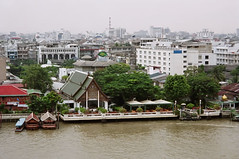(First published by Transitions Abroad)
 Stupa at the Grand Palace in Bangkok
Stupa at the Grand Palace in Bangkok
Within ten days of arriving in Thailand, it is possible to have a job.
The best way to get a teaching job is to get on a plane, fly to Bangkok, and search once you are there. This can seem intimidating. Many worry that they will arrive with a tight budget and not find work.
It is a logical fear, but unfounded. If you are a native English speaker and have a college degree (any subject) you can get a job in ten days. Just follow the steps below.
Day 0: Pre-arrival
There are a number of things to do before boarding the plane.
1. Pack nice clothes. For men that means ties, collared shirts, and trousers (or khakis). For women, bring two or three business outfits. Pack a nice pair of dress shoes.
2. Resume. Put together a resume before leaving. Save it to disc (CD) so it can be printed at an internet shop in Bangkok. Emphasize teaching, training, and travel experience.
3. Degree. Bring your college diploma in a protective case, such as a hard plastic tube. Bring several copies.
4. College transcripts. Some employers ask for university transcripts. Request these before leaving home and pack several copies.
5. Reference letters. Most employers ask for 2-3 references. Arrange these before departing. Ex-bosses, teachers, and co-workers make the best references. Ask each to write a brief letter of recommendation. Tell them you are applying for English teaching jobs. Ask them NOT to date the letter (so you can use it for a long time) and to include an address, phone number, and email address.
6. Pre-contact the big chains. Before leaving, send emails to the big schools in Bangkok such as ECC, Inlingua, AUA, and English Plus. These schools have multiple branches and continual job openings. Email a brief letter - tell them when you will arrive, summarize your qualifications, and ask to set up an interview. Paste your resume into the body of the email. You may have a job waiting when you arrive.
Day 1: Arrival
If you are on a tight budget, head straight to the backpackers' area in Banglumpoo (Khao San Rd). Use a Lonely Planet or Rough Guide to find a guest house for any budget. Relax. Sleep. No job search today.
Day 2: Get Bearings
No job search today. Sleep late. Take a stroll. Let body and mind adjust to the new environs. Only one task today. Unpack one set of interview clothes. If they are badly wrinkled, take them to the guest house's laundry service and have them ironed. Once ironed, hang them up. Polish shoes if they need polishing. Unpack resume disc, degree, transcripts, etc.
Day 3: Mobile Phone
Employers will want to call. Asking them to leave a message at a guest house is both tacky and unreliable. It is best to get a cell phone. Mobile phones are cheap and easy to find. Take a taxi to the Central Shopping Mall in Pinklao. Tell the driver Sentan Pinklao. On the fourth floor of the mall are many shops that sell both new and used phones. A good phone goes for 2000-2500 Baht (around $50) although cheaper is certainly possible.
You have a phone, now you need a telephone number. For that, you must buy a "sim card". The main sim-card service providers are DTAC and 1-2-Call. They are both reliable and easy to use. Most mobile phone shops also sell sim cards, and will install them (very easy to do). If they do not, take the phone directly to the DTAC (4th floor) or 1-2-Call (2nd floor) office. A sim card costs about 300 Baht ($7.50). Once you have a sim card, you can receive calls. Before leaving the store, ask the staff to switch your language options to English.
Finally, to make calls you must put minutes on the phone. This is done by buying prepaid phone cards, available at any convenience store (including the omnipresent 7-11s). Simply go to the counter and ask for a DTAC or 1-2-Call Card (depending on which sim card you have). Cards come in 200, 300, and 400 Baht amounts. To activate the card, call the access number (printed on the card), then enter the serial number (followed by #) and password (followed by #). In a few seconds, the money is added to the account.
Day 4: Computer Work
Go to an internet cafe with the disc that holds your resume. Open the resume and add the new phone number to the top. Then print twenty copies. Cheaper shops charge only 5 Baht per copy (100 Baht equals about $2.50). Store resumes in a thick folder to keep them clean and unwrinkled.
Next, head to www.ajarn.com. This is the main internet site for teaching jobs in Thailand. Scan the job listings and copy any that sound promising. Email a cover letter and resume to each job. It is better to paste the resume into the body of the email rather than attach it as a file. Many people will not open attachments. In the cover letter, tell the school that you are currently in Bangkok and are interested in a position immediately. Ask them to look at your resume and ask for an interview. End the letter with your phone number and email address.
Take a break, get some food, stretch your legs. Then back to the internet shop for round two. Visit www.daveseslcafe.com. Go to the international job board. This site is not specific to Thailand but there are often Thai jobs listed. Scan the entire list and email promising Thai jobs, even if the listing is old. Always state that you are now in Thailand. Always ask for an interview (politely) and always include contact information at the end of the letter (even though it is also on the resume).
The final task for Day 4 is to contact the big chains - the ones you emailed from home. Send each another email. Stress that you are now in Bangkok and are prepared to start work immediately.
Day 5: Hit the Pavement
Put on business clothes, gather a stack of resumes, diploma copies, and copies of reference letters. Almost all schools will ask for a recent photo when you apply, so head to Khao San Road. Khao San has numerous photo shops that take Polaroid passport-size pictures. Most charge 100 Baht for four pictures. Get 12 or more.
Next, check email for responses from yesterday's inquiries. Immediately call or email any schools that express an interest. Schedule an interview and get directions to the school.
The remainder of Day 5 will be spent visiting schools. This is an inefficient way of job searching, but it is good to have face to face encounters. Get comfortable talking to employers. Smile and show enthusiasm. The best place for walk-in visits is Siam Square, which has a high concentration of English schools. Tell the taxi driver Siam Square. Once there, just stroll. The British Council, ECC, English First, Go Chula, and Siam Computer have schools in or near Siam Square, as do a few smaller companies. There is an Inlingua branch across the street, in the Siam Discovery shopping mall. Visit these schools.
Then take the BTS sky train to Ratchidamri station. From the station, walk south (towards Lumpini Park) for five minutes to arrive at AUA, a large and well known language school. Drop off a resume and try to arrange an interview. Next, go to the tall building immediately next to AUA (to the right). There is an EFL school on the first floor. Visit them.
When visiting schools, greet the receptionist, ask to talk to someone about a teaching position and hand them a resume. Smile. You may get an interview, and a job offer, on the spot.
But do not be discouraged if nothing happens. Remember, the purpose of walk-ins is to grow more comfortable talking to employers.
Day 6: The Bangkok Post and The Nation
After breakfast, go straight to a bookstore (or coffee shop) and grab a copy of The Bangkok Post and The Nation: Bangkok's English language newspapers. Sit down and scan the classifieds. They always contain ads for English teachers. Circle them and immediately call those which list phone numbers. Mention that you meet their qualifications and are interested in a position. Arrange an interview.
Next, get back on the internet and check email for responses to inquiries. Immediately respond to them, preferably by phone. Arrange interviews. Email contacts from the Bangkok Post and The Nation that could not be contacted by phone.
By this time, interviews should be rolling in, so devote the rest of the day to them. When interviewing always overdress. Dress like a banker. No matter how casual the job itself may be, it is best to dress very conservatively for the interview. This is especially true in Thailand, where many employers will judge you by appearance, smile, and enthusiasm more than qualifications or work experience. In Thailand, it is often better to look good than to be good!
Day 7: Interviews
Check email and respond to inquiries. The rest of the day is devoted to interviews, as several should be scheduled by now. Dress well, smile, and show enthusiasm.
Day 8: Relax
Unless there is a promising interview scheduled, take it easy today. Sleep late. Get a massage. Relax. Do check email and respond to inquiries, but otherwise this is a rest day.
Day 9 & 10: Interviews and Contracts
Check Ajarn.com and respond to new job listings. Check email every morning- and immediately respond to inquiries. By Day 9 you should have one or more job offers. Do not accept the first job offered. Examine the contract carefully. Ask questions: How many hours a week will you teach? (over 25 is too much). Will they sponsor a work visa? (They should). Will they help find an apartment? (They should). How much do they pay? (300 Baht an hour is bare minimum). If possible, talk to other teachers at the school and confirm that they are treated well and paid on time. Once satisfied, sign a contract.
By following the above steps, anyone can find a job in ten days or less. TESOL jobs in Thailand do not pay well by Western standards. However, by local standards they are more than adequate. By living simply it is possible to cover expenses and save $200-300 dollars a month. Furthermore, there are a huge number of jobs. With a neat appearance and a little organization, it is easy to find a job within ten days of landing in Bangkok. Follow the steps above, and success is assured.
For More Info
Ajarn
www.ajarn.com
The best internet job board for Thailand. Also general information about living and working in Thailand.
Dave's ESL Cafe
www.daveseslcafe.com
His international job board contains Thailand openings. Also a lot of information about teaching English, including lesson ideas.
ECC Thailand
www.eccthai.com
A major chain with branches throughout Bangkok and Thailand.
Inlingua
www.inlinguathailand.com
A major chain with many branches.
English Plus
www.eltcom.com
Another of the large language school chains.
AUA
www.auathailand.org
A well respected language school with several branches.
Stickman's Guide to Bangkok
www.stickmanbangkok.com
Extensive information about living and working in Bangkok, including information about English schools.
Effortless Language Acquisition
www.effortlessacquisition.blogspot.com
My other blog. What to do once you get the job: Teaching techniques and resources.
 Chao Praya River, Bangkok
Chao Praya River, Bangkok